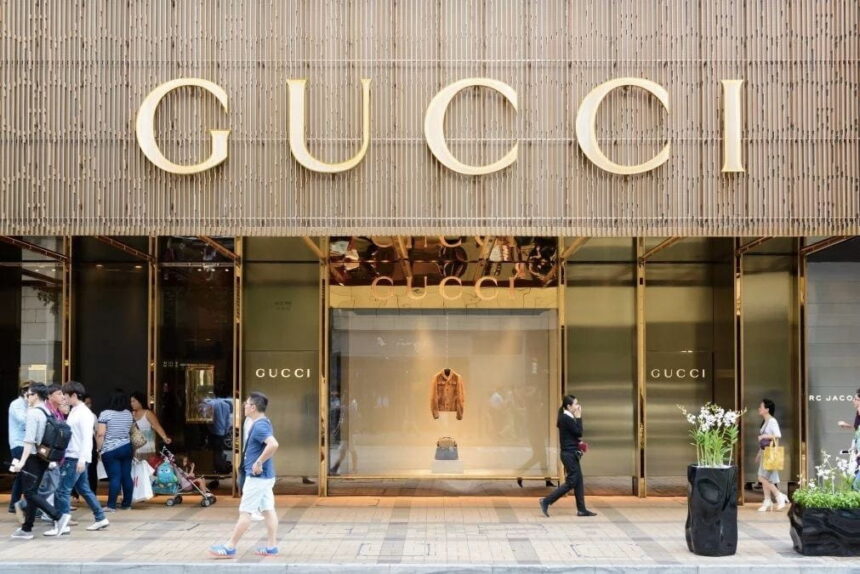Shares of Kering SA, the French luxury conglomerate and parent company of Gucci, dropped over 5% on Thursday following disappointing first-quarter earnings that fell short of analyst expectations. The sharp revenue decline highlights ongoing challenges in the global luxury fashion market, particularly in Asia, where demand has significantly cooled.
According to Kering’s Q1 financial report released Wednesday, total group revenues plummeted 14% year-on-year to €3.9 billion ($4.4 billion). This came in below the consensus forecast of €4.01 billion by analysts at LSEG (London Stock Exchange Group). The shortfall reflects ongoing macroeconomic headwinds, weakening global consumer confidence, and intensified competition within the high-end fashion space.
Gucci Sales Dip 25% as Rebrand Efforts Continue
Gucci, which accounts for nearly half of Kering’s revenue, posted a troubling 25% decline in sales on a comparable basis, totalling €1.57 billion for the quarter. The iconic brand is currently undergoing a major repositioning, spearheaded by newly appointed artistic director Demna Gvasalia. However, investor sentiment remains cautious due to previous controversies surrounding Gvasalia’s creative direction during his time at Balenciaga.
Despite the leadership shake-up, Gucci’s designs have struggled to resonate with modern luxury consumers. Analysts cite brand fatigue, misaligned creative strategies, and excessive reliance on Chinese shoppers—a segment heavily impacted by a regional economic slowdown.
Regional Breakdown: Asia Leads the Decline
Kering’s underperformance was primarily driven by a 25% drop in Asia-Pacific sales, followed by 13% declines in both North America and Europe. The steep decline in Asia—historically a high-growth market for luxury goods—reflects ongoing weakness in Chinese consumer demand due to economic uncertainty and fading appetite for ultra-premium fashion.
François-Henri Pinault, Chairman and CEO of Kering, acknowledged the turbulent start to 2025, stating:
“We faced a difficult start to the year. In this environment, we are fully focused on executing our action plans to reach our strategic and financial objectives and strengthen the positioning of our Houses in all markets.”
He emphasized that Kering is boosting vigilance to navigate ongoing macroeconomic risks, noting that the group remains committed to long-term brand rejuvenation and market competitiveness.
Broader Luxury Sector Impact
Kering’s struggles are emblematic of a wider slowdown in the luxury sector, which has been grappling with high inflation, shifting consumer preferences, and uncertainty in global markets. Although luxury brands are often perceived as resilient to economic downturns due to their affluent clientele, brands like Kering—with recent sales challenges—are finding it harder to pass on higher costs through price increases.
In contrast, rivals like LVMH (Moët Hennessy Louis Vuitton) appear better positioned, citing pricing power and stronger brand affinity as levers for maintaining profitability amid headwinds.
Adam Cochrane, luxury and retail analyst at Deutsche Bank, commented:
“Weaker global stock markets and broader economic uncertainty will weigh on consumer confidence. We see this further postponing a recovery in luxury demand.”
Despite luxury labels historically being more resilient due to their ability to absorb rising costs and maintain premium pricing, Kering’s situation reveals the limits of that strategy. Unlike LVMH, which has emphasized pricing power and market segmentation, Kering appears to be more constrained by price sensitivity and elastic demand.
Outlook and Recovery Strategy
While the Q1 results paint a grim picture, Kering remains optimistic about its turnaround plans. The company aims to revamp product lines, refine brand messaging, and regain relevance with younger luxury shoppers, particularly Gen Z and affluent millennials. Analysts note that successful repositioning of Gucci will be pivotal to Kering’s future growth trajectory.
As the luxury fashion industry navigates these turbulent waters, Kering’s next moves—especially around brand reinvention, pricing strategies, and digital engagement—will be critical in determining whether it can reclaim lost market share and investor confidence in the months ahead.
However, with tariff impacts, softening sentiment in China, and increasing scrutiny over brand image, the road to recovery may be bumpy.






